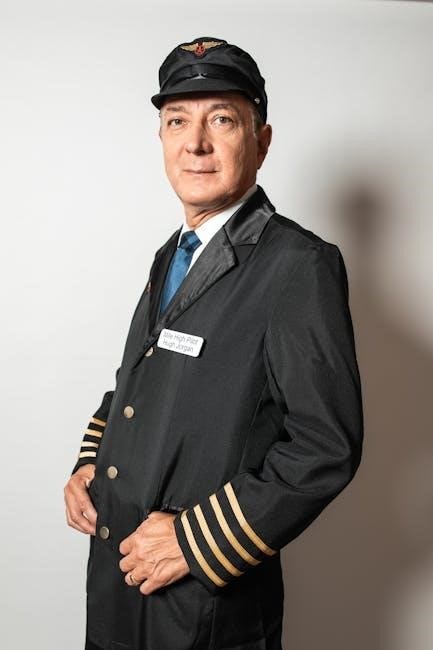The commercial pilot oral exam is a critical step toward obtaining a commercial pilot license, assessing knowledge of aircraft systems, weather, navigation, regulations, and safety practices. It evaluates a pilot’s ability to think critically and communicate effectively under real-world scenarios.

Understanding the Exam Format and Content
The commercial pilot oral exam is a verbal assessment conducted by an FAA inspector or designated examiner. It is an interview-style test designed to evaluate a candidate’s knowledge, decision-making skills, and ability to apply aviation principles in real-world scenarios. The exam typically lasts 1-2 hours and covers a wide range of topics, including aircraft systems, weather, navigation, regulations, and safety practices. Candidates are expected to demonstrate a deep understanding of these subjects and explain complex concepts clearly.
The format is conversational, with the examiner asking targeted questions to assess the candidate’s comprehension and problem-solving abilities. Questions may involve scenario-based situations, such as handling emergencies or navigating in challenging conditions. The exam also focuses on the practical application of knowledge, ensuring the pilot can think critically and make sound judgments under pressure.
While the specific content varies depending on the aircraft and the candidate’s flight experience, the exam is designed to ensure readiness for the responsibilities of a commercial pilot. Thorough preparation, including studying FAA publications and practicing with mock interviews, is essential for success.
Study Materials and Resources
Preparing for the commercial pilot oral exam requires a comprehensive study plan and the right resources. The Federal Aviation Regulations (FAR/AIM) and the Pilot’s Handbook of Aeronautical Knowledge are essential study materials, providing foundational knowledge on aviation rules, weather, navigation, and aircraft systems. Additionally, the Instrument Rating and Commercial Pilot Oral Exam Guide is a valuable resource, offering insights into common questions and topics covered during the exam.
Study guides and checkride preparation books are highly recommended, as they include practice questions and scenarios to help candidates familiarize themselves with the exam format. Online forums and aviation communities, such as those found on websites like Reddit or specialized aviation platforms, offer tips and advice from experienced pilots who have gone through the process.
Flight schools and instructors often provide tailored study materials and conduct mock oral exams to help students assess their readiness. Digital tools, such as flight simulator software and aviation apps, can also aid in visualizing aircraft systems and weather conditions. Finally, reviewing FAA publications and staying updated on the latest aviation guidelines ensures a well-rounded preparation for the exam. By leveraging these resources, candidates can build confidence and achieve success.

Aircraft Systems and Performance
Understanding aircraft systems and performance is a cornerstone of the commercial pilot oral exam. Candidates must demonstrate a deep knowledge of how aircraft systems function, including propulsion, fuel, electrical, hydraulic, and pneumatic systems. Examiners often ask detailed questions about system components, their interconnections, and how malfunctions can be identified and managed.
Performance-related topics include climb and cruise capabilities, takeoff and landing distances, and the impact of weight and altitude on aircraft behavior. Pilots must also explain how to calculate performance metrics using charts and formulas. Weather conditions, such as wind and temperature, significantly affect aircraft performance, and examiners may ask how these factors influence decision-making.
A thorough understanding of the aircraft’s limitations and capabilities is essential. Candidates should be able to discuss stall speeds, load factors, and the effects of icing or other environmental hazards. Practical scenarios are often presented, requiring pilots to apply their knowledge to real-world situations.
Studying the Pilot’s Operating Handbook (POH) and Federal Aviation Regulations (FARs) is crucial, as they provide detailed information on aircraft performance and operational limits. Additionally, practice with sample questions and mock exams helps build confidence and readiness for the oral exam.
Weather and Navigation
Weather and navigation are critical components of the commercial pilot oral exam, requiring a strong understanding of meteorology, navigation systems, and their practical application. Candidates must demonstrate the ability to interpret weather forecasts, reports, and radar imagery to make informed flight decisions. Key topics include understanding METARs, TAFs, wind shear, thunderstorms, icing conditions, and fog, as well as how these factors impact aircraft performance and safety.
Navigation skills are equally important, with a focus on VOR, GPS, NDB, and RNAV systems. Pilots must explain how to use these systems for precise location and route adherence, including the limitations and potential errors associated with each. Examiners often ask candidates to describe how they would navigate in various scenarios, such as instrument meteorological conditions (IMC) or system failures.
Situational awareness is also emphasized, as pilots must integrate weather and navigation data to maintain safe flight operations. This includes understanding how to read and interpret sectional charts, approach plates, and en route charts. Additionally, knowledge of NOTAMs, PIREPs, and ATC instructions is essential for real-world application. Mastery of these concepts ensures that pilots can operate safely and efficiently in diverse conditions.

Regulations and Safety Practices
Regulations and safety practices are fundamental to the commercial pilot oral exam, ensuring compliance with aviation laws and promoting safe flight operations. Candidates must demonstrate a thorough understanding of Federal Aviation Regulations (FARs), particularly Title 14 CFR Part 91 and Part 135, which govern general aviation and commercial operations, respectively. Key areas include pre-flight and post-flight requirements, airworthiness directives, and aircraft maintenance logs. Safety practices such as risk management, crew resource management (CRM), and emergency procedures are also emphasized, with examiners assessing a pilot’s ability to apply these concepts in real-world scenarios. Additionally, knowledge of airspace classifications, right-of-way rules, and communication protocols with air traffic control (ATC) is crucial. Pilots must explain their approach to safety checks, passenger briefings, and emergency preparedness, showcasing their commitment to maintaining the highest standards of safety. Mastery of these regulations and practices is essential for a pilot to operate legally and safely, ensuring the well-being of passengers and crew.
The Oral Exam Process
The oral exam process for a commercial pilot license is a comprehensive assessment conducted by a FAA inspector or designated examiner. It evaluates a candidate’s knowledge, decision-making, and communication skills. The exam typically lasts 1-2 hours and covers a wide range of topics, including aircraft systems, weather, navigation, regulations, and safety practices. Candidates are expected to demonstrate a deep understanding of aviation principles and their practical application.
During the exam, the examiner will ask scenario-based questions to simulate real-world flying situations. This helps assess the candidate’s ability to think critically and make sound judgments. Preparation is key, as candidates should review their aircraft’s flight manual, maintenance logs, and relevant FAA publications. Practicing with a flight instructor or through mock interviews can also help build confidence and improve communication skills.
The oral exam is not just about recalling facts but also about articulating thoughts clearly and professionally. Candidates are encouraged to ask clarifying questions if needed but should avoid unnecessary jargon. The examiner’s goal is to ensure the candidate is prepared to operate safely and effectively as a commercial pilot. Passing the oral exam is a significant milestone, demonstrating readiness for the practical checkride.

Common Questions and Topics
The commercial pilot oral exam covers a variety of topics, ensuring a candidate’s comprehensive knowledge of aviation. Common questions focus on aircraft systems, such as propeller and engine operations, as well as electrical and fuel systems. Weather is another critical area, with examiners asking about interpreting forecasts, understanding weather hazards, and making sound decisions based on meteorological conditions.
Navigation skills are also thoroughly tested, including the use of charts, GPS, and traditional methods like pilotage and dead reckoning. Candidates should be prepared to discuss regulations, such as airspace classifications, flight restrictions, and compliance with FAA rules. Safety practices, including emergency procedures, risk management, and crew resource management, are also essential topics.
Scenario-based questions are frequently used to assess decision-making. For example, candidates might be asked how they would handle an unexpected weather change or a system malfunction. Additionally, they may be queried about their knowledge of aircraft performance, including takeoff and landing calculations, weight and balance, and climb rates. Being well-versed in these areas is crucial for a successful exam.
Techniques for Effective Communication
Effective communication is paramount during the commercial pilot oral exam, as it demonstrates a candidate’s ability to articulate complex aviation concepts clearly and confidently. To excel, candidates should practice organizing their thoughts logically, using clear and concise language, and maintaining a professional demeanor. Active listening is equally important, ensuring that responses directly address the examiner’s questions.
One key technique is to avoid jargon or overly technical terms unless necessary, making explanations accessible. Additionally, candidates should be prepared to elaborate on their answers, providing specific examples or scenarios to illustrate their points. Practicing common questions beforehand helps build confidence and ensures smooth delivery.
Another valuable strategy is to use a structured approach when answering, such as identifying the key components of a question and addressing each systematically. For instance, when discussing weather, focus on interpretation, decision-making, and safety implications. By combining clarity, organization, and confidence, candidates can effectively communicate their knowledge and readiness for the responsibilities of a commercial pilot.
Practical Demonstration and Scenario-Based Questions
The commercial pilot oral exam often includes scenario-based questions designed to assess a candidate’s decision-making skills and practical knowledge. These questions simulate real-world situations, such as navigating through adverse weather conditions or managing aircraft system malfunctions. Candidates are expected to demonstrate how they would handle these scenarios, showcasing their ability to think critically and apply theoretical knowledge effectively.
Examiners may present hypothetical flight scenarios and ask candidates to outline their approach, including pre-flight planning, in-flight decisions, and post-flight actions. For example, a question might involve explaining how to respond to an unexpected weather alert or detailing the steps to take during an emergency landing. The goal is to evaluate not only the candidate’s technical expertise but also their problem-solving abilities and situational awareness.
To prepare for these questions, candidates should practice analyzing various flight scenarios and discussing their strategies in a clear, structured manner. Reviewing case studies and engaging in mock interviews can help build confidence and ensure readiness for the practical aspects of the exam. By demonstrating a logical and safety-focused approach, candidates can effectively showcase their qualifications as a commercial pilot.
Passing the commercial pilot oral exam requires thorough preparation, confidence, and effective communication. Stay calm, listen carefully to each question, and provide clear, concise answers. Practice with mock interviews and review real-world scenarios to build familiarity with the exam format.
Focus on understanding core concepts rather than memorizing answers, as examiners aim to assess your practical knowledge and decision-making skills. Stay organized by breaking down complex topics into manageable sections during your study sessions.
Lastly, trust your training and showcase your passion for aviation. Demonstrating a commitment to safety, professionalism, and continuous learning will leave a positive impression. With dedication and practice, you’ll be well-prepared to succeed in your commercial pilot oral exam.

